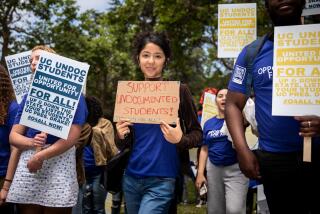Media Dealt Setback in Open Meeting Case
SAN FRANCISCO — The California Supreme Court barred a student newspaper Tuesday from attempting to prove at trial that former Gov. Pete Wilson and the UC Board of Regents violated the state’s open meeting law before voting to abolish affirmative action at the nine campuses.
The unanimous ruling, based on the timing of the newspaper’s lawsuit, was a defeat for news media statewide. They had argued that the paper should be allowed to proceed with its claims in the interest of preventing government subterfuge and ensuring public accountability.
The Daily Nexus at UC Santa Barbara alleged that Wilson--in violation of the state’s open meeting act--privately conferred with several regents to line up the 1995 vote to end affirmative action.
The newspaper sought a declaration that Wilson and the regents broke the law, and as a result, to have the vote against affirmative action nullified.
But the state high court said the student newspaper should have filed its suit within 30 days of the regents’ vote. The newspaper said it filed suit once it learned of the violation--nearly seven months after the vote.
Daniel Tokaji, an attorney with the American Civil Liberties Union of Southern California, which represented the student paper, said Tuesday’s ruling “strikes a blow right in the gut of the open meeting act.”
“It provides a virtual recipe for public officials to act in secret and then get away with it,” he said.
The ACLU still plans to go to court to demand that Wilson turn over his telephone records and other documents from the days before the regents’ action. Although the suit against Wilson and the regents is now dead, the ACLU said it is important for future cases to show that a governor’s telephone records are public documents.
The court, in an opinion written by Justice Stanley Mosk, said the open meeting act allowed for the nullification of actions taken in violation of the law “only under strict conditions”--if the challenge was made within 30 days of the action.
“Its purpose evidently arose as it struck a balance between two, at least potentially conflicting, objectives--to permit the nullification and voidance of certain actions but not to imperil the finality of . . . such actions unduly,” Mosk wrote. “It accordingly chose to craft a powerful weapon but to restrict its range.”
Jeffrey Blair, a UC lawyer, praised the court’s decision. The court found that the ability of government to make decisions without fear of future nullification was “more important than some bad conduct that may fall through the cracks,” he said.
Blair also denied the allegations that Wilson spoke to at least 11 of the 26 regents before the affirmative action vote. “I don’t believe that he did,” Blair said.
Cynthia J. Larsen, an attorney for Wilson, said Wilson held several “completely permissible” conversations with regents before the affirmative action vote.
At issue was whether the regents formed a collective commitment to oppose affirmative action in these conversations, she said.
Blair said the university will oppose the ACLU’s attempt to force Wilson to turn over his telephone records because they are protected under previous court decisions.
Roger Myers, who represented several California newspapers, including The Times, in the case, called the ruling “a victory for secrecy in government.”
“It’s a defeat for the entire concept that government by the people requires that the people know what government is doing,” said Myers.
More to Read
Sign up for Essential California
The most important California stories and recommendations in your inbox every morning.
You may occasionally receive promotional content from the Los Angeles Times.











